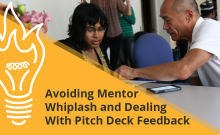When you’re looking for startup funding, you end up talking to a lot of people. And those people have a lot of opinions about you, your company, and your pitch deck.
Let me guess…You spent hours putting together your best pitch deck, you practiced and prepared intensely for this presentation, you edited your pitch based on countless feedback from advisors about your story, the message, even down to the way you designed the slide or the photo you used for your headshot. And yet again, you hear the ear-grating words “Great pitch, but you really need to…” Whamm! It hits you again. Pitch deck Mentor Whiplash. This piece of advice is completely the opposite of what you were told yesterday! “On this slide, I think you should…” Wham! Again, mentor whiplash. Wham! Wham! Back and forth you go.

| Condition | Mentor Whiplash |
| Strain | PitchDeck-itis |
| Description | Being given different, often contradictory advice on improving your pitch or pitch deck by different mentors (or in an even worse variation of the disease: contradictory advice by the same mentor on different days) |
| Symptoms | Intense irritation every time you get feedback on your pitch. Constant, frustrating changes to your pitch deckFeelings of hopelessness and confusionWorrying that your pitch will never be finished. Fighting back the urge to slap your mentor in the face. Pleading with the pitch deck gods for mercy |
Causes of Mentor Whiplash
First things first, breathe. It is ok. You are not alone, everyone gets mentor whiplash when they pitch. Whether you’re looking for startup funding, pitching in a competition, or applying to an accelerator program, you’re going to have to put together a pitch deck. That pitch deck is a visual aid or visual document that helps you to convey complex information on your business in a shortened period of time. You’re usually trying to cram ALOT into that pitch deck, and it’s hard to figure out what to include vs. leave out, and how to convey what you want to convey.
That’s where mentors come in! Like any good founder you know that you do not know everything. And, you reach out to your mentors for advice on your deck. In a startup ecosystem that is increasingly revolving around pitch decks, you may likely attend one of many events and help sessions that provide practice and feedback on your pitch deck too. That’s a whole lot of eyes on your deck. Most interestingly, it is a whole lot of eyes your your deck who all have VERY different levels of experience with raising capital, VERY different skills sets and backgrounds, and VERY different understandings of you and your company. Therefore, each piece of advice you receive has a very high likelihood of being very different from each other piece of advice.
Sorry, There is no Cure
This is not something that will ever stop. For two reasons. First, your pitch deck will never be “perfect”, there is no such thing as a perfect pitch deck. And secondly, as long as you get feedback from multiple people, you will get conflicting viewpoints.
It’ll never be perfect
That’s right, I am sorry to break it to you that there is no “perfect” pitch deck. In fact, there is no “one” pitch deck no “the pitch deck” for your company. You will inevitably be refining your company and concept as you scale and grow, so you will need to update your pitch deck to reflect new and important parts of your story. And, even if that weren’t the case, you have multiple versions of your pitch deck to put together in the first place. The act of pitching live vs. sending a pitch deck to potential investors via email affects how those decks should be designed, and the audience to which you pitch affects your story and what kinds of content you will be presenting. IE: for the pitch competition you may have one deck, and for investors another. So your pitch deck is a living, breathing animal.
It’s not your mentor’s fault, it’s yours (kind of)
Because you want your pitch deck to be as perfect as you can get it for any particular pitch, you will want to talk to mentors and strangers for their advice. More advice from more places is usually a good thing, and pitch decks are no exception. A variety of views is helpful so you don’t miss something important, and so that your pitch will be compelling to a wide variety of audiences. But gathering multiple viewpoints will almost always mean sifting through multiple conflicting viewpoints. Because no two of your mentors are exactly the same – some have finance backgrounds, some have marketing backgrounds, some have a design eye and others don’t, some have been with you from day one and know everything about your business and it’s many pivots, some just met you this week. There will be conflicting viewpoints whipping you back and forth. And that is ok. It is frustrating, I know, but it is ok. It was actually what you were looking for, even if you didn’t know it.
How to Effectively Cope with this “Illness”
Ok, so Mentor Whiplash sounds pretty scary huh? No worries, we’ve got you covered. Here are some tips and tricks for coping with the challenging symptoms of this “disease”.
- Don’t forget that you wanted different viewpoints, this struggle will make you, your pitch and your company better
- Spend some time really evaluating feedback, rather than blindly making the changes
- Keep in mind the mentor’s point of view, experience and background when considering his/her recommendations
- When in doubt, ask a mentor “why” he/she gave a certain piece of feedback
- Try to understand and implement the intent behind the feedback given, not necessarily the exact recommendation or word change
- Evaluate the kinds of mentors you’ve asked for advice and make sure the spread of their experience and insights is well rounded, if its not, look for more.
- When in doubt, defer to yourself. You know your business more than anyone, if you’re not comfortable with some of the advice you receive from a mentor do not feel like you HAVE to include it
- Never lose your voice, your pitch should always sound like something you would feasibly say
Keep these in mind as you build a pitch deck and gather feedback from your mentors and the nagging symptoms of Mentor Whiplash will certainly lessen. Best of luck and happy pitching!






